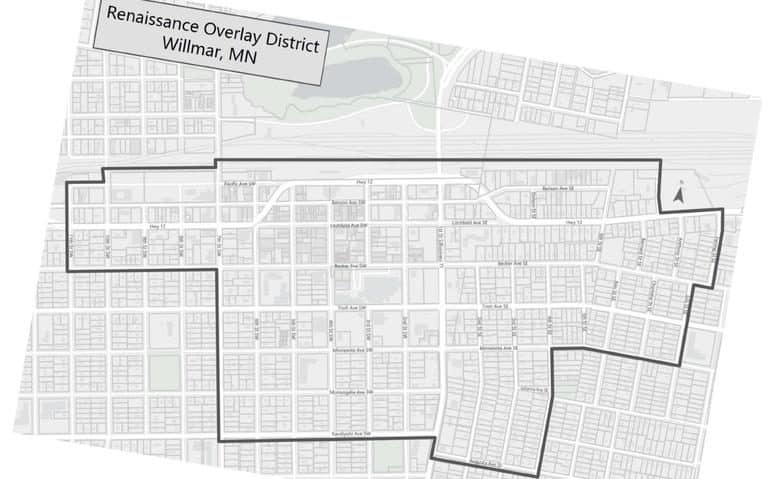WILLMAR — The Renaissance has arrived in downtown Willmar. With the Willmar City Council approval of the zoning ordinance establishing the Renaissance Zone District, economic development professionals hope it will usher in an era of rebirth for the zone, including new commercial and residential projects.
“We are hoping this new overlay will encourage investment and activity in the area,” said Dave Ramstad, Willmar Planning and Development director, at the May 4 meeting of the Willmar City Council.
The council unanimously approved the ordinance following a public hearing during its remote meeting May 4. There was no public comment, though a call-in line was established to give residents a chance to speak during the hearing. Also approved by the entire council were development incentives including parking requirements and project permit fee waivers. There were also changes made to the parking restrictions in the district.
The council made no comments regarding the approvals.
The Willmar Renaissance Zone was created by Willmar Planning and Development Department staff. The idea was first discussed in January and since then has gone through weeks of discussion and vetting, with dozens of stakeholders asked for input.
“It has been a long road getting this vetted,” Ramstad said in an interview with the West Central Tribune on May 5.. “This is a big project, a really big incentive.”
The Renaissance Zone will encompass downtown Willmar, a portion of the U.S. Highway 12 and First Street South corridors and residential areas east of First Street and south of Highway 12 and a portion between Seventh Street and 11th Street Southwest and from Pacific Avenue to Becker Avenue Southwest.
In mid-April the first portions of the zone were brought to the Willmar City Council’s Community Development Committee and the Willmar Planning Commission for final discussion and approval.
The incentives approved by the City Council in this first phase for projects within the zone include abating all city fees for building permits, land use applications and sign permits as well as the sewer availability charge and water availability charge. If there is a federal or state fee, those will continue to be charged.
“I am just really excited. I think the idea that people can come and build practically unfettered in the Renaissance Zone will be a big draw,” Ramstad said.
The approved ordinance also makes changes to off-street parking requirements in the city’s zoning ordinance. Developers will be able to receive parking credits, not to exceed 50 percent of the usual minimum parking spaces required, if certain alternate requirements are met, such as construction or use of below-grade contextual or camouflaged parking, installing bike parking or installing electric vehicle charging stations. For instance, if a developer adds bicycle parking to its design, the city could allow a reduction in the number of off-street parking spaces for vehicles required for the project.
The approved zone includes the federal Opportunity Zone program area of downtown Willmar and the Highway 12 corridor. This program allows developers with capital gains to invest in projects and get a break on their capital gains taxes. The Renaissance Zone and its development incentives were created to bring development opportunities to a wider range of people, not just those with capital gains. The Renaissance Zone incentives will also be available to Opportunity Zone projects.
“I think this is going to augment the Opportunity Zone,” Ramstad said.
Other Renaissance Zone development incentives that will come to the council table sometime in the future include possible tax abatements for development projects in the Renaissance Zone, a loan program for facade renovation and possible free city-owned land. Each of the incentives will have its own eligibility requirements, with some more strict than others. If eligible, one project in theory could take advantage of all of the incentives.
“We’ll probably bring them a couple at a time” to the council, Ramstad said. “They’re more complicated.”
The Renaissance Zone and its incentives will be in place for at least five years, through 2025.
“I think it is really going to be successful,” Ramstad said.
In another move to make doing business downtown easier for all, the council approved changing parking enforcement period: 9 a.m. to 5 p.m. Monday through Friday. The restrictions will no longer be applied on weekends or on holidays.
With the Renaissance Zone in place, Ramstad hopes it will entice more development to an area of town that has seen very little in new, private sector projects over the past several years, if not decades.
“All of this is made to be a catalyst to get others building and improving,” Ramstad said.
Article written by Shelby Lindrud for the West Central Tribune on May 19th, 2020.

